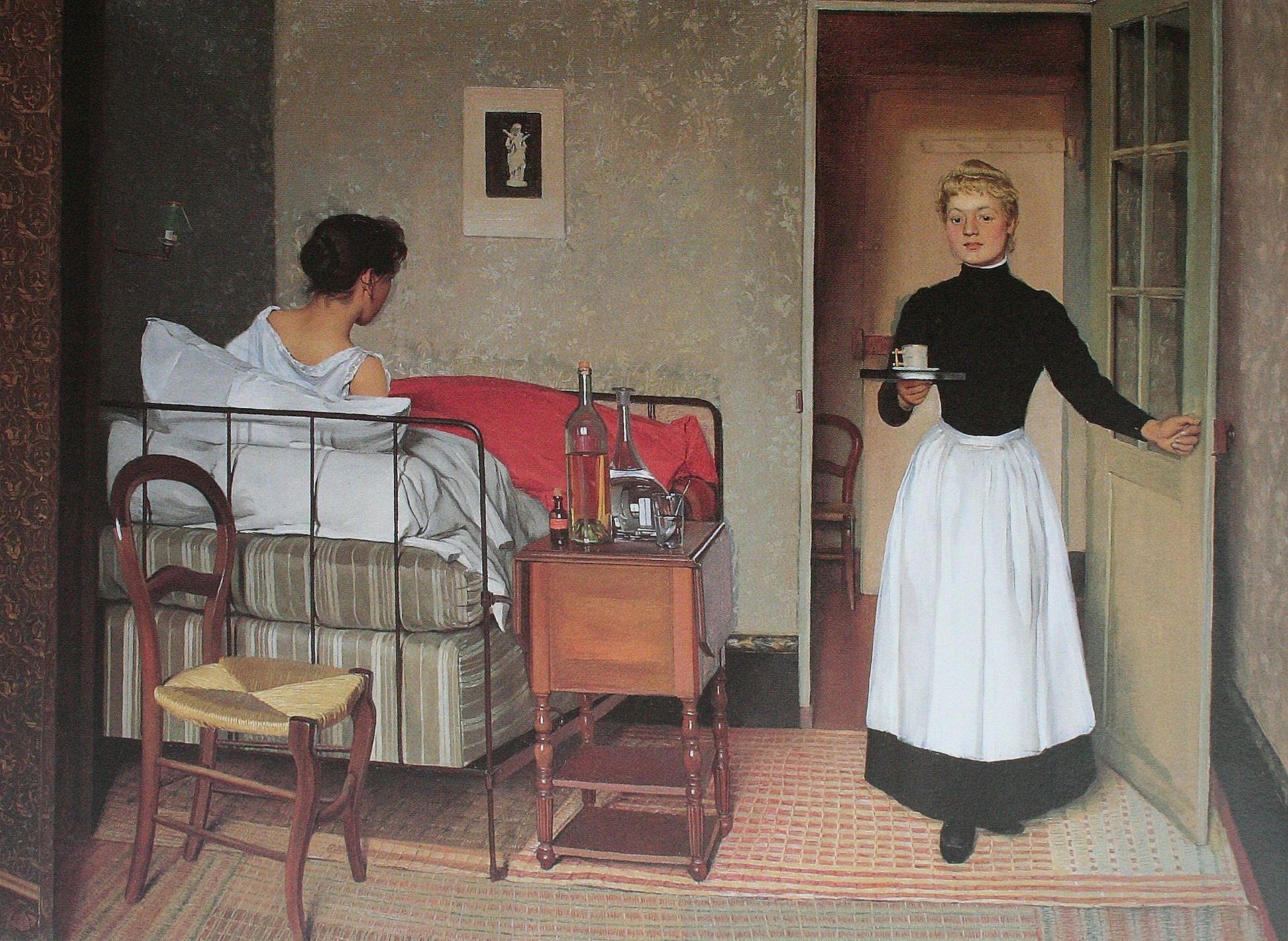Illness

Félix Vallotton:
La Malade (The Patient): Hélène Chatenay (1892)
"This Illness does not render her any more special than she already was, which was always considerable."
©2022 by David A. Schmaltz - all rights reserved
Illness seems different and distinct from mere sickness. Sickness seems an interruption, something contracted then resolved as a matter of course. In most cases, one simply recovers from the flu without long-lingering symptoms. Illnesses seem unique in that recovery's not presumed. They typically do not just take care of themselves. They need treatment. Sometimes, a course of medicine counterbalances the intrusion; often, more extensive interventions: surgery, quarantining, physical therapy, hospitalization, psychological counseling. Some of these responses might continue for the rest of the patient's life while others come in passing. One does not necessarily ever recover from an Illness. The Parkinson's my mom contracted at sixty was still with her when she died at ninety-something, though it had progressed considerably from its beginning as a questionable quivering into a totally debilitating presence. A person might be rendered free of cancer, but they're not considered "cured" until cancer-free for five years.
The Muse found a lump in her throat and to her credit, she followed up on it. I consider this act courageous. Her doctor ordered a CAT scan then referred her to a throat specialist. He took pictures and performed a biopsy before definitely declaring her Illness cancer. A following PET scan showed that she'd caught it early before it had spread from its original location, though its position probably renders in inoperable. A second opinion is pending as of this writing, but a course of treatment has been slowly coalescing as she's been consulting with a dizzying array of professionals, each with opinions, each with perspectives. The story gets repeated until it becomes coherent, from prudent suspicion toward cogent prescription. Radiation and chemo-therapy seem the likely treatment, six or seven weeks of progressive Hell, poisoning the patient to kill the intruder.
The cure for cancer often involves making the patient sicker. It will not be the cancer that lays our Muse low, but the cure which will disable her so. Inducing Illness to cure the Illness, a battle of malign forces focused upon fixing the condition. The Muse's type of cancer seems eminently treatable. The specialists suggest a likely ninety percent probability of full remission and a one hundred percent probability of suffering through the process. This prescription poses a disturbing question. It invites agreement to make the Illness worse to affect treatment. The patient must collude in their own digression as a precondition for effecting cure. This situation seems almost inhuman, though we should be accustomed to it. Dental work requires the willing consent of its target, who knows full well that they'll suffer as a part of the cure. An Illness like cancer, though, offers an exponential expansion of willing suffering.
I can appreciate why some refuse such treatment and flee into what's euphemistically referred to as "alternative" cures, what some might refer to as denial. While some cancers have spontaneously responded to prayer, for instance, that situation's rare enough that the church might beautify the practitioner. Sainthood happens later. Cancer happens now. It's not a single Illness but an array of them, each kind the focus of specific strategies. The Muse's was caused by a virus and so carries a specific profile which aids in its treatment. A similar Illness, the result of tobacco and booze, proves much more difficult to treat. Witnessing The Muse as she gathers and considers all the factors of her Illness leaves me relieved that I managed to drop the tobacco habit and also to wonder why I didn't get it. I feel as though I at least deserve the Illness for the years of abuse I visited upon myself while she did nothing but be born female in an era before a preventative vaccine was invented. Illness knows no morals and dispenses no justice. It just is whatever it is.
The doctors warn of a loss of control, a period utterly lacking self-determinism. The regimen will take over, demanding a daunting discipline. Some panic and flee toward the exit. None find the experience easy and, regardless of the cause, none who contract any Illness, deserve it, however errant or short-sighted their former lifestyle. The Muse insists that cancer was never her fate, not retribution, but more of an accident, an act of chance rather than justice. It represents one of the array of experiences and everyone will very likely experience at least one of them before finally exiting this world. In short, this Illness is not about her. It might well serve as a medium for her deep learning, but it will never be about any god or demon trying to get even with her by torturing her soul. It is an Illness after all, one of the many experiences likely to befall anyone here. This Illness does not render her any more special than she already was, which was always considerable.


